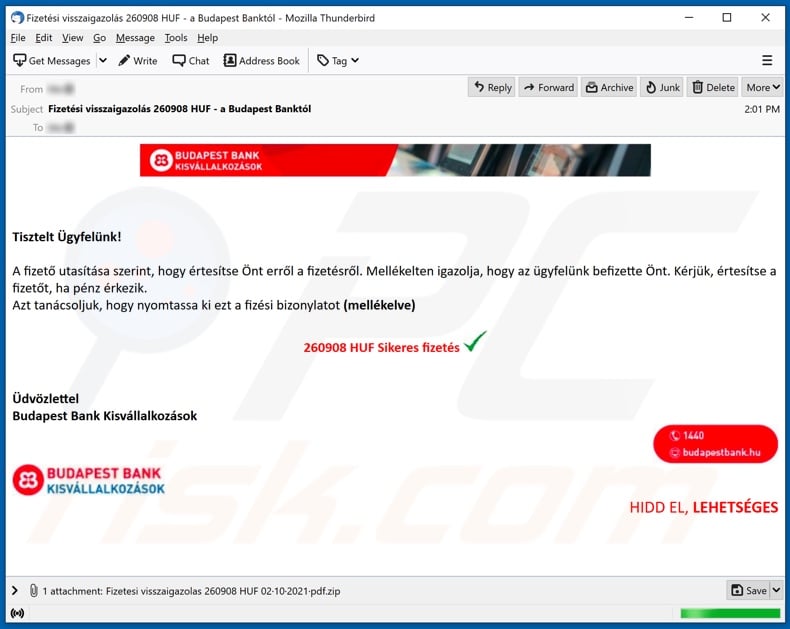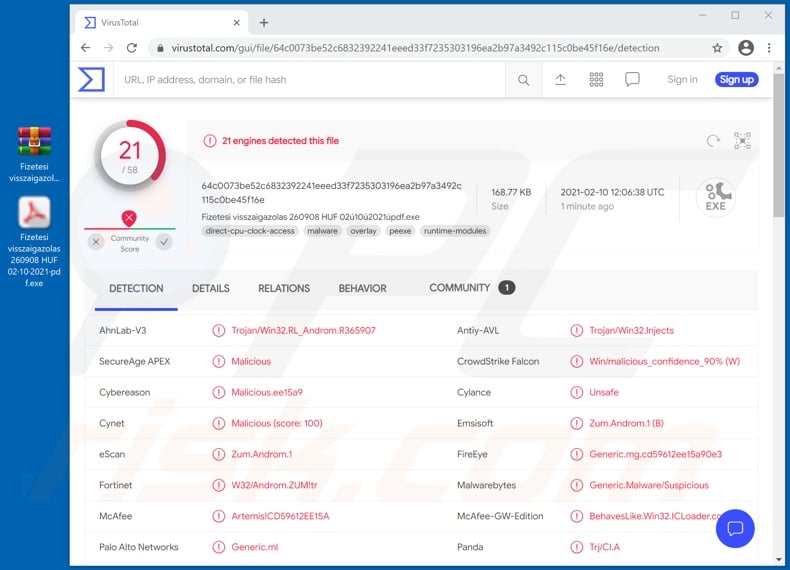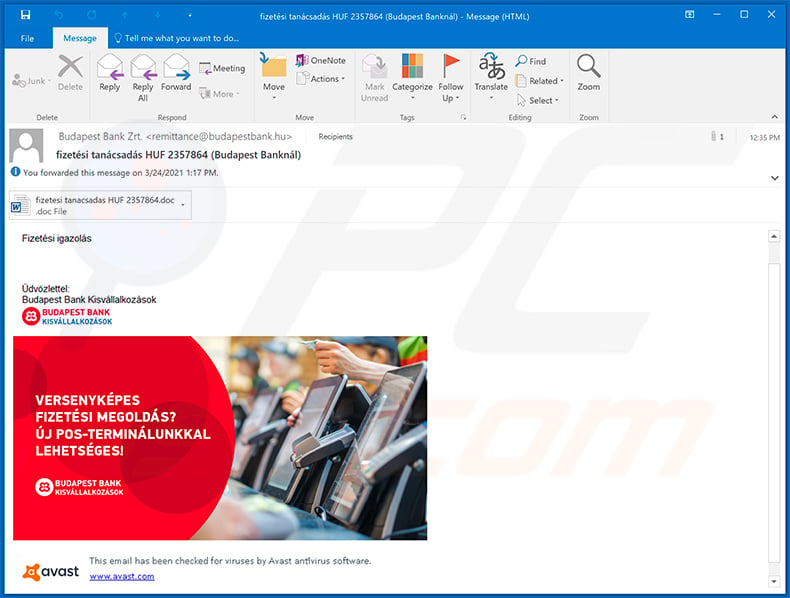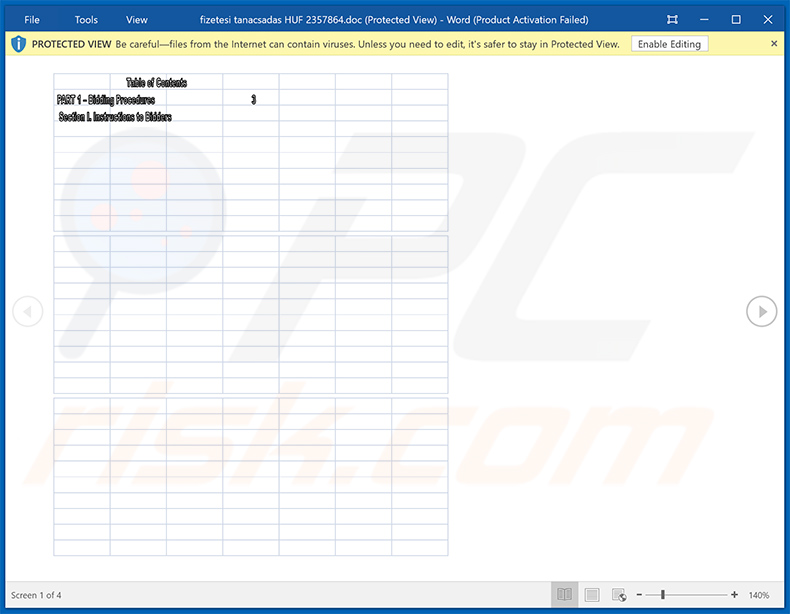Avoid infecting your device via fake "Budapest Bank" emails
Phishing/ScamAlso Known As: Budapest Bank spam
Get free scan and check if your device is infected.
Remove it nowTo use full-featured product, you have to purchase a license for Combo Cleaner. Seven days free trial available. Combo Cleaner is owned and operated by RCS LT, the parent company of PCRisk.com.
What is the fake "Budapest Bank" email?
"Budapest Bank email virus" refers to a spam campaign proliferating the LokiBot Trojan. The term "spam campaign" defines a large-scale operation during which scam emails are sent by the thousand. The messages sent through this campaign are presented as payment confirmations from the Budapest Bank.
Note that these emails are fake, and are in no way associated with the real Budapest Bank. The file attached to the scam messages contains LokiBot malware.

According to a rough translation, the fake "Budapest Bank" emails (subject/title "Fizetési visszaigazolás 260908 HUF - a Budapest Banktól" may vary) are presented as notifications concerning a successful payment. The messages may seem legitimate as they contain the actual logo and other graphical design elements used by the genuine Budapest Bank.
These scam emails are supposedly sent due to a customer's request to notify the recipient of their payment. The attachment is stated to be the proof of payment. The messages then ask to inform the customer of the payment's successful transfer into the recipient's account. The messages also recommends that the user print the fake bank statement.
Upon opening, however, the malicious attachment triggers the infection chain of the LokiBot Trojan. The primary functionality of LokiBot is extracting and exfiltrating sensitive information. This malware can extract sensitive information (e.g., log-in credentials) from browsers and other applications.
The Trojan also has keylogging capabilities, and can thus record key-strokes (i.e., typed information).
Cyber criminals typically target the following data: browsing and search engine histories, IP addresses, geolocations, log-in credentials (e.g., IDs, usernames, and passwords), names, surnames, addresses, emails, telephone numbers, banking account and credit card details, etc.
For example, hijacked communication accounts (e.g., emails, social media/networking, etc.) can be used to ask contacts for loans and/or spread malware under the guise of the genuine owner. Stolen online bank accounts and others that deal with finances/ financial information can be used to make fraudulent transactions and online purchases.
LokiBot's capabilities are even more extensive on Android operating systems. As well as collecting private data, the Trojan can imitate various app interfaces, lock the screen and encrypt stored data (to make ransom demands), self-proliferate via text messages and emails, etc.
To summarize, LokiBot infections can result in severe privacy issues, financial losses, and even identity theft. If it is suspected/known that the LokiBot trojan (or other malware) has already infected the system, use anti-virus software to remove it immediately.
| Name | Budapest Bank spam |
| Threat Type | Trojan, password-stealing virus, banking malware, spyware. |
| Hoax | Scam emails are presented as successful payment notifications. |
| Disguise | Scam emails are disguised as mail from Budapest Bank. |
| Attachment(s) | Fizetesi visszaigazolas 260908 HUF 02-10-2021-pdf.exe (filename may vary) |
| Detection Names | Avast (Win32:PWSX-gen [Trj]), Emsisoft (Dropped:Trojan.GenericKD.36325967 (B)), Fortinet (W32/Androm.ZUM!tr), Malwarebytes (Spyware.LokiBot), McAfee (RDN/Generic.dx), Full List Of Detections (VirusTotal) |
| Symptoms | Trojans are designed to stealthily infiltrate the victim's computer and remain silent, and thus no particular symptoms are clearly visible on an infected machine. |
| Payload | LokiBot |
| Distribution methods | Infected email attachments, malicious online advertisements, social engineering, software 'cracks'. |
| Damage | Stolen passwords and banking information, identity theft, the victim's computer added to a botnet. |
| Malware Removal (Windows) |
To eliminate possible malware infections, scan your computer with legitimate antivirus software. Our security researchers recommend using Combo Cleaner. Download Combo CleanerTo use full-featured product, you have to purchase a license for Combo Cleaner. 7 days free trial available. Combo Cleaner is owned and operated by RCS LT, the parent company of PCRisk.com. |
"Ministero Dello Sviluppo Economico", "C.H. Robinson", "Zoho Email Virus", and "Cobra Industrial Machines" are some examples of other malware-spreading spam campaigns. The deceptive messages are usually disguised as "official", "priority", "important", and similar.
As well as distribution of malicious programs, spam campaigns are also used for phishing and other scams. Due to the relative prevalence of spam mail, exercise caution with incoming emails.
How did "Budapest Bank email virus" infect my computer?
Typically, cyber criminals behind malspam campaigns send emails with a file attached to them or a download link to the malicious file. Their main goal is to trick recipients into opening/executing the rogue file, which then installs malicious software.
Some examples of files that cyber criminals send via email are Microsoft Office and PDF documents, executables (.exe), JavaScript, and archives (ZIP, RAR).
Note that malicious documents that are opened with Microsoft Office 2010 or newer versions install malicious software only if users enable macros commands (enable editing/content). These versions include "Protected View" mode, which does not allow opened malicious documents to install malware automatically. Older versions do not include this feature and install malicious software without asking permission.
How to avoid installation of malware
To avoid malware spread via spam mail, you are strongly advised against opening suspicious or irrelevant emails, especially those with any attachments or links present within them.
Additionally, use Microsoft Office versions released after 2010. Malicious programs also proliferate through untrusted download channels (e.g. unofficial and free file-hosting sites, Peer-to-Peer sharing networks and other third party downloaders), illegal software activation ("cracking") tools, and fake updaters.
Therefore, only download from official/verified sources and activate and update software with tools/functions provided by legitimate developers.
To ensure device integrity and user privacy, have a reputable anti-virus/anti-spyware suite installed and kept updated. Furthermore, use these programs to run regular system scans and to remove detected/potential threats.
If you have already opened "Budapest Bank email virus" attachment, we recommend running a scan with Combo Cleaner Antivirus for Windows to automatically eliminate infiltrated malware.
Text presented in the "Budapest Bank" scam email message:
Subject: Fizetési visszaigazolás 260908 HUF - a Budapest Banktól
Tisztelt Ügyfelünk!
A fizető utasítása szerint, hogy értesítse Önt erről a fizetésről. Mellékelten igazolja, hogy az ügyfelünk befizette Önt. Kérjük, értesítse a fizetőt, ha pénz érkezik.
Azt tanácsoljuk, hogy nyomtassa ki ezt a fizési bizonylatot (mellékelve)
260908 HUF Sikeres fizetés
Üdvözlettel
Budapest Bank Kisvállalkozások
HIDD EL, LEHETSÉGES
Screenshot of VirusTotal detections of the malicious attachment distributed via "Budapest Bank" spam campaign ("Fizetesi visszaigazolas 260908 HUF 02-10-2021-pdf.exe"):

Another Budapest Bank-themed spam email used to spread LokiBot malware via attached malicious MS Word document:

Text presented within:
Subject: fizetési tanácsadás HUF 2357864 (Budapest Bankál)
Fizetési igazolás
Üdvözlettel:
Budapest Bank Kisvállalkozások
BUDAPEST BANK
KISVÁLLALKOZÁSOKVERSENYKÉPES
FIZETÉSI MEGOLDÁS?
ÚJ POS-TERMINÁLOKKAL
LEHETSÉGES!BUDAPEST BANK
KISVÁLLALKOZÁSOK
Screenshot of the attached malicious MS Word document:

Instant automatic malware removal:
Manual threat removal might be a lengthy and complicated process that requires advanced IT skills. Combo Cleaner is a professional automatic malware removal tool that is recommended to get rid of malware. Download it by clicking the button below:
DOWNLOAD Combo CleanerBy downloading any software listed on this website you agree to our Privacy Policy and Terms of Use. To use full-featured product, you have to purchase a license for Combo Cleaner. 7 days free trial available. Combo Cleaner is owned and operated by RCS LT, the parent company of PCRisk.com.
Quick menu:
- What is Budapest Bank spam?
- Types of malicious emails.
- How to spot a malicious email?
- What to do if you fell for an email scam?
Types of malicious emails:
![]() Phishing Emails
Phishing Emails
Most commonly, cybercriminals use deceptive emails to trick Internet users into giving away their sensitive private information, for example, login information for various online services, email accounts, or online banking information.
Such attacks are called phishing. In a phishing attack, cybercriminals usually send an email message with some popular service logo (for example, Microsoft, DHL, Amazon, Netflix), create urgency (wrong shipping address, expired password, etc.), and place a link which they hope their potential victims will click on.
After clicking the link presented in such email message, victims are redirected to a fake website that looks identical or extremely similar to the original one. Victims are then asked to enter their password, credit card details, or some other information that gets stolen by cybercriminals.
![]() Emails with Malicious Attachments
Emails with Malicious Attachments
Another popular attack vector is email spam with malicious attachments that infect users' computers with malware. Malicious attachments usually carry trojans that are capable of stealing passwords, banking information, and other sensitive information.
In such attacks, cybercriminals' main goal is to trick their potential victims into opening an infected email attachment. To achieve this goal, email messages usually talk about recently received invoices, faxes, or voice messages.
If a potential victim falls for the lure and opens the attachment, their computers get infected, and cybercriminals can collect a lot of sensitive information.
While it's a more complicated method to steal personal information (spam filters and antivirus programs usually detect such attempts), if successful, cybercriminals can get a much wider array of data and can collect information for a long period of time.
![]() Sextortion Emails
Sextortion Emails
This is a type of phishing. In this case, users receive an email claiming that a cybercriminal could access the webcam of the potential victim and has a video recording of one's masturbation.
To get rid of the video, victims are asked to pay a ransom (usually using Bitcoin or another cryptocurrency). Nevertheless, all of these claims are false - users who receive such emails should ignore and delete them.
How to spot a malicious email?
While cyber criminals try to make their lure emails look trustworthy, here are some things that you should look for when trying to spot a phishing email:
- Check the sender's ("from") email address: Hover your mouse over the "from" address and check if it's legitimate. For example, if you received an email from Microsoft, be sure to check if the email address is @microsoft.com and not something suspicious like @m1crosoft.com, @microsfot.com, @account-security-noreply.com, etc.
- Check for generic greetings: If the greeting in the email is "Dear user", "Dear @youremail.com", "Dear valued customer", this should raise suspiciousness. Most commonly, companies call you by your name. Lack of this information could signal a phishing attempt.
- Check the links in the email: Hover your mouse over the link presented in the email, if the link that appears seems suspicious, don't click it. For example, if you received an email from Microsoft and the link in the email shows that it will go to firebasestorage.googleapis.com/v0... you shouldn't trust it. It's best not to click any links in the emails but to visit the company website that sent you the email in the first place.
- Don't blindly trust email attachments: Most commonly, legitimate companies will ask you to log in to their website and to view any documents there; if you received an email with an attachment, it's a good idea to scan it with an antivirus application. Infected email attachments are a common attack vector used by cybercriminals.
To minimise the risk of opening phishing and malicious emails we recommend using Combo Cleaner Antivirus for Windows.
Example of a spam email:

What to do if you fell for an email scam?
- If you clicked on a link in a phishing email and entered your password - be sure to change your password as soon as possible. Usually, cybercriminals collect stolen credentials and then sell them to other groups that use them for malicious purposes. If you change your password in a timely manner, there's a chance that criminals won't have enough time to do any damage.
- If you entered your credit card information - contact your bank as soon as possible and explain the situation. There's a good chance that you will need to cancel your compromised credit card and get a new one.
- If you see any signs of identity theft - you should immediately contact the Federal Trade Commission. This institution will collect information about your situation and create a personal recovery plan.
- If you opened a malicious attachment - your computer is probably infected, you should scan it with a reputable antivirus application. For this purpose, we recommend using Combo Cleaner Antivirus for Windows.
- Help other Internet users - report phishing emails to Anti-Phishing Working Group, FBI’s Internet Crime Complaint Center, National Fraud Information Center and U.S. Department of Justice.
Share:

Tomas Meskauskas
Expert security researcher, professional malware analyst
I am passionate about computer security and technology. I have an experience of over 10 years working in various companies related to computer technical issue solving and Internet security. I have been working as an author and editor for pcrisk.com since 2010. Follow me on Twitter and LinkedIn to stay informed about the latest online security threats.
PCrisk security portal is brought by a company RCS LT.
Joined forces of security researchers help educate computer users about the latest online security threats. More information about the company RCS LT.
Our malware removal guides are free. However, if you want to support us you can send us a donation.
DonatePCrisk security portal is brought by a company RCS LT.
Joined forces of security researchers help educate computer users about the latest online security threats. More information about the company RCS LT.
Our malware removal guides are free. However, if you want to support us you can send us a donation.
Donate
▼ Show Discussion